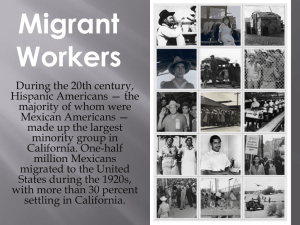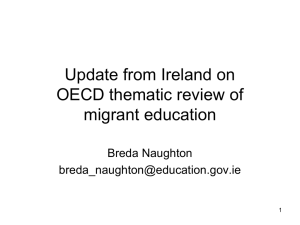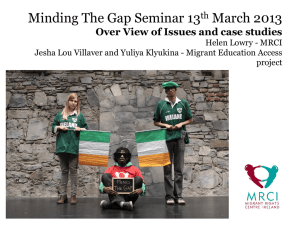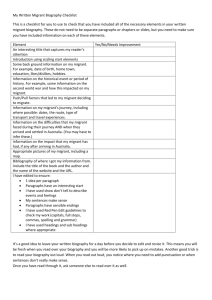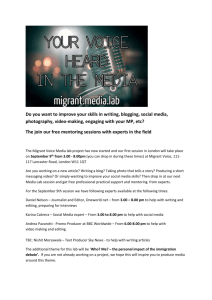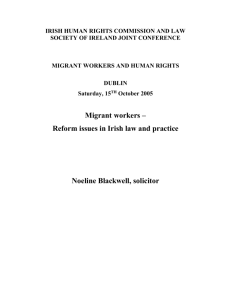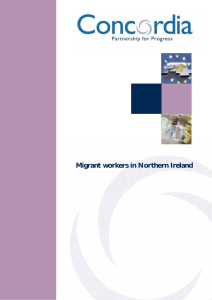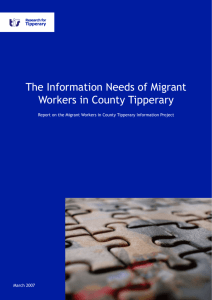Children, Youth and Community Relations
advertisement
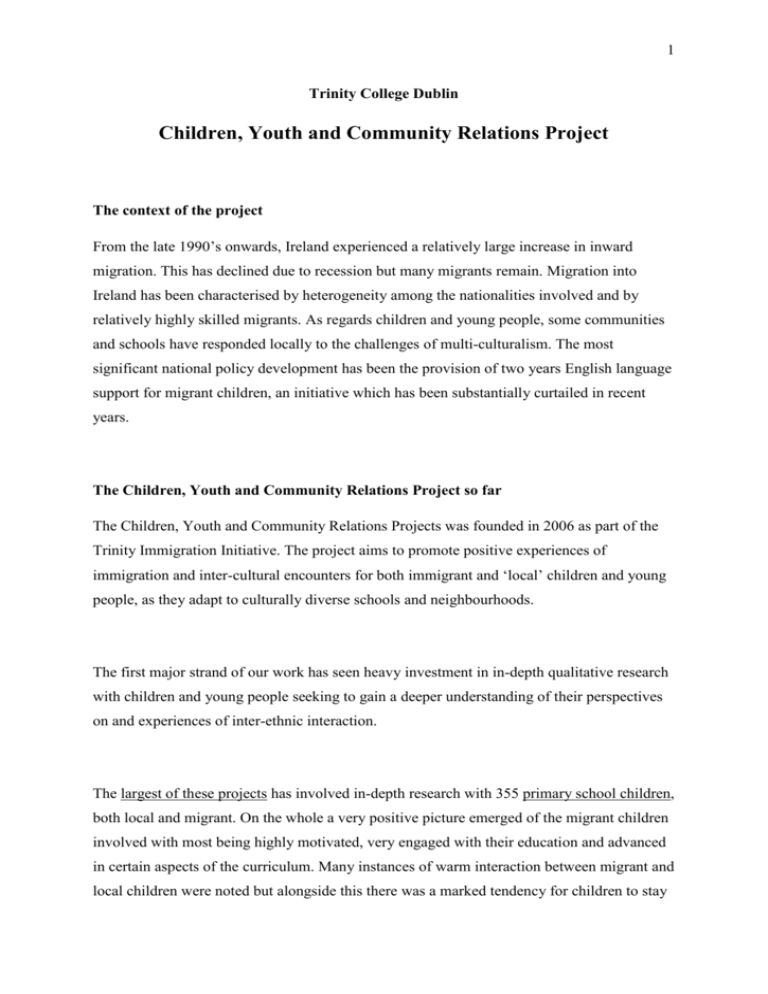
1 Trinity College Dublin Children, Youth and Community Relations Project The context of the project From the late 1990’s onwards, Ireland experienced a relatively large increase in inward migration. This has declined due to recession but many migrants remain. Migration into Ireland has been characterised by heterogeneity among the nationalities involved and by relatively highly skilled migrants. As regards children and young people, some communities and schools have responded locally to the challenges of multi-culturalism. The most significant national policy development has been the provision of two years English language support for migrant children, an initiative which has been substantially curtailed in recent years. The Children, Youth and Community Relations Project so far The Children, Youth and Community Relations Projects was founded in 2006 as part of the Trinity Immigration Initiative. The project aims to promote positive experiences of immigration and inter-cultural encounters for both immigrant and ‘local’ children and young people, as they adapt to culturally diverse schools and neighbourhoods. The first major strand of our work has seen heavy investment in in-depth qualitative research with children and young people seeking to gain a deeper understanding of their perspectives on and experiences of inter-ethnic interaction. The largest of these projects has involved in-depth research with 355 primary school children, both local and migrant. On the whole a very positive picture emerged of the migrant children involved with most being highly motivated, very engaged with their education and advanced in certain aspects of the curriculum. Many instances of warm interaction between migrant and local children were noted but alongside this there was a marked tendency for children to stay 2 separate from other ethnic groups. Racism and bullying were also reported among even very young children and in some instances this could be very severe. Migrant children often have very limited social lives outside of school and compared to local peers engage in very few organised activities other than church. The findings from this project have been published as a book, ‘Where to from here? Inter-ethnic relations among children in Ireland’ (2011), which also discusses the policy implications of this research. We are currently involved in a knowledge exchange project (funded by IRCHSS) which seeks to engage with teachers, parents and policy makers around some of the key issues identified in this book. The large amount of data from this study has also been used as the basis for PhD studies which look in greater depth at issues to do African boys (Lindsey Garratt) and families of migrants (Jennifer Scholtz). In conjunction with the leading migrant rights NGO in Ireland we have also conducted a national qualitative study which involved 167 migrant teenagers. These teenagers talked in a more articulate and self-conscious way about some of the issues identified in our work with primary school children, such as racism, separateness and lack of leisure opportunities. The teenagers also identified issues particular to themselves such as difficulties in communication and cultural misunderstanding, burdensome home duties and unique difficulties for those who had arrived at a later age. Our qualitative work in primary schools lead directly to two projects of a more quantitative nature. The first of these is systematic review funded by IRCHSS and supported by the Campbell Collaboration which examines the impact of Cooperative learning on inter-ethnic interaction in multi-cultural schools. This project is due for publication in September 2011. The second project is a Phd study by Kate Babineau who is developing a child-centred survey instrument to measure some of the key outcomes noted in the qualitative project (e.g. crossethnic interaction, racism etc.). 3 Our future work The following are some of the research projects which we have identified as high priority for studying and positively influencing inter-cultural relations among children in Ireland. Intervention research which aims to increase inter-ethnic interaction and reduce prejudice and racial bullying. In particular we are looking at approaches to intervention which have a strong theoretical and evidence foundation and which are relatively easy to implement. Given the expertise that we have built up in the area of systematic reviewing and meta-analysis we plan to do further systematic reviews of interventions other than cooperative learning. We have developed a state-of-the-art, child-centred and validated instrument which measures children’s perceptions of inter-ethnic contact and conflict. As yet no representative data has been collected from children in Ireland on these issues. We plan to survey areas of Ireland with high concentrations of migrant children. Given the small amount of quantitative and representative data that is available on migrant children in Ireland we are also working to mine what data is available through secondary analysis of both the Growing Up in Ireland data and data collected from school principals for the ESRI Adapting to Diversity study. We also believe that there are a number of very important qualitative research projects that need to be done including studies which look at transitions ( primary to secondary school, secondary school to beyond), migrant parenting practices in relation to education and peer interaction and a detailed examination of how adults perceive the rights and norms of the social world of children.


